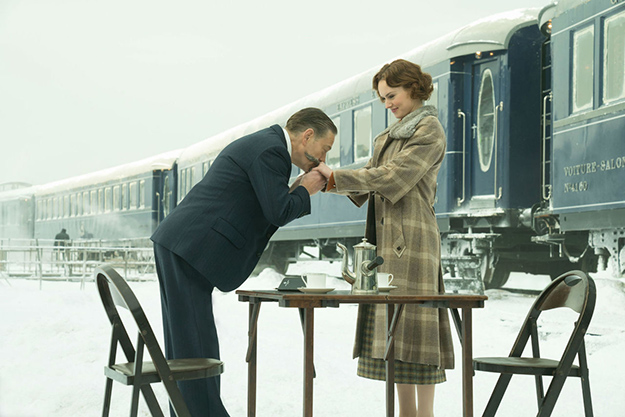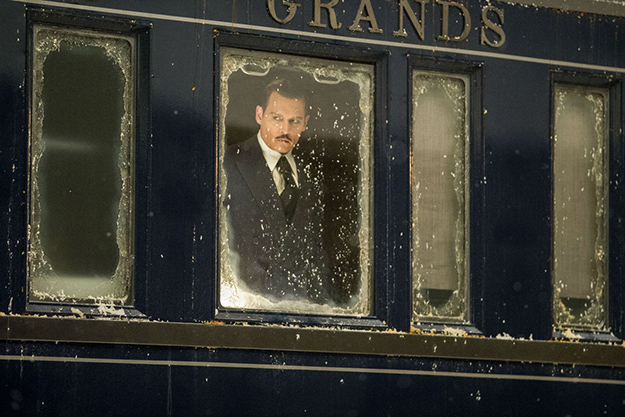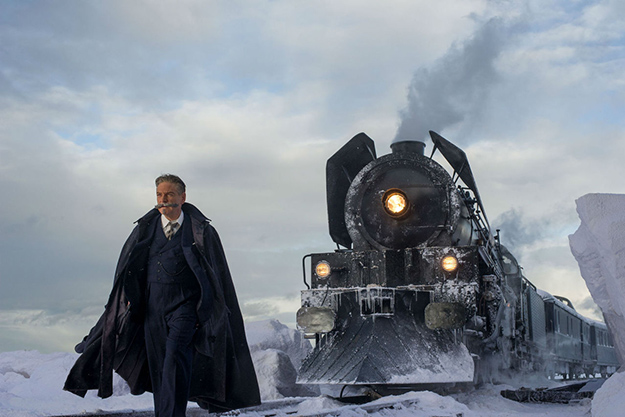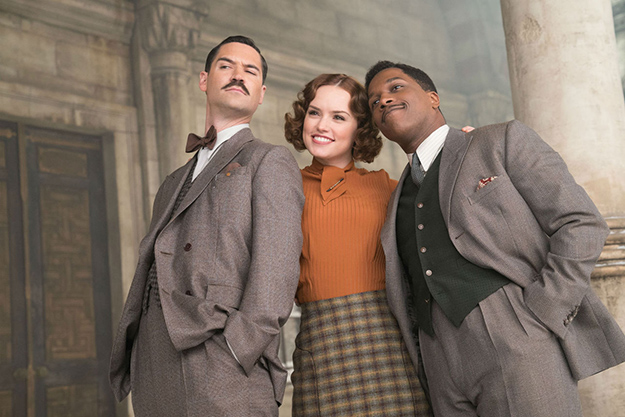Film of the Week: Murder on the Orient Express

The ending of Agatha Christie’s Murder on the Orient Express was once so well-known that there’s no point issuing a spoiler warning: it would be like tripping delicately around Rosebud being a sled. So if you were going to make a new film of the 1934 Christie novel—previously adapted for cinema in 1974 by Sidney Lumet, and three times for television, once in Japan—you’d really have to change the payoff, wouldn’t you?
Wrong—but that’s the only real surprise in Kenneth Branagh’s new film. If you already know the outcome—and if you’re one of those people who think there’s only conceivable one reason to bother with a whodunit—then you may not feel you need to watch this at all. Yet one thing about this Murder on the Orient Express is substantially different. That is Hercule Poirot’s moustache. In the past, whether played by Albert Finney (in Lumet’s film), Peter Ustinov, David Suchet (the long-running British TV Poirot and, many feel, the best), or others, the character has generally sported a dainty little number with pointy ends. In Christie’s novel, however, Poirot is “a little man with enormous moustaches.”
Now, as played by Branagh, Poirot is clearly not a little man, and doesn’t carry himself like one: he fairly fills the screen with irrepressible largeness of presence. This is the first screen Poirot to come on like a matinee idol, a swashbuckler, a veritable Indiana Jones of the “little grey cells.” His moustache, on the other hand, is indeed enormous. Or rather, as Christie specifies, his “enormous moustaches,” plural. A complex confection in salt-and-pepper stripes—hence its on-set nickname, “the Badger”—Poirot’s whiskers are more like a moustache within a moustache, or one set of whiskers grafted onto another. It could almost have been designed by H.R. Giger, if he did facial hair. The thing is so huge, and the corridor of the Orient Express so narrow, that it’s a wonder that Poirot doesn’t carve deep grooves along its exquisitely lacquered wooden walls as he passes.

This is not Poirot as we know him; yet in every other respect, Branagh’s film is Murder on the Orient Express as many of us know it all too well. He doesn’t bring much new to the basic conception—a bunch of famous actors play eccentrics cooped up on a train, with secrets to be unearthed. But he does embellish the template with glossy extras. In particular, there’s a lavishly superfluous prologue set in Jerusalem, which begins with a young Arab boy dashing through the streets just to bring the fastidious European sleuth his breakfast eggs—all to Patrick Doyle’s “full of Eastern promise” music, which would have been rejected as too corny for The Mummy Returns. After solving a mystery involving a priest, a rabbi, and an imam, the great Belgian sleuth—a representative of one Europe’s most notorious colonialist powers—declares his findings to a wonderstruck crowd of diverse Eastern extras gathered at the foot of the Wailing Wall. Oh dear—we seem to have accidentally boarded the Orientalist Express.
Then it’s off to an Istanbul gussied up with CGI skylines and sunsets, where some fancy long-take camerawork introduces the main cast as they board the train and stand looking out of its windows like carefully placed figures in an Advent calendar. At one ominous moment, we hear an announcement listing all the many scheduled stops on the line to Paris, but mercifully, the ride is only 114 minutes long, largely restricted to an unplanned stopover in a snowy mountain pass. That incident gives rise to the one image in the film with any real resonance: Poirot looking down from the train, suspended high above an unfathomable abyss. It’s a mercy that the image is allowed to speak for itself, for this is exactly the kind of film in which you expect Poirot to declare, “I am like a man suspended high above an unfathomable abyss.”
The passenger list includes various A-listers (Johnny Depp, Michelle Pfeiffer, Judi Dench, Willem Dafoe, Penélope Cruz), together with a few lesser luminaries (Daisy Ridley, Leslie Odom Jr.), and also Josh Gad. One person will be horribly murdered: all the others will behave suspiciously or flamboyantly, or (in the case of Dench’s Russian countess—and why, after all, should Dame Judi put herself out?) do little but maintain a regal sourness throughout. Some of the cast are very good value: as a menacing American, Depp wears his new facial heaviness to good effect, while Pfeiffer’s cosmopolitan adventuress, as they used to be called, is exuberantly louche (“A lady has certain needs”). Conversely, an underused Cruz plays it pious and desiccated; Dafoe sports antique glasses; the great Olivia Colman gets to do very little; and Gad is only interesting because he looks as if he might be the son of the Jon Polito character in Miller’s Crossing. The fruitiest performances, almost worth seeing the film for, are given by ballet superstar Sergei Polunin and Lucy Boynton as a pair of reclusive aristos steeped in decadence and Barbital (“I take oceans of it!” she announces). Meanwhile, it’s a decidedly contemporary touch—not that it offsets the archaic prologue—to have the tweedy Englishman Arbuthnot played by an African-American actor, although Tony winner Leslie Odom Jr. doesn’t convince with his accent.

But then, shaky accents are part of the deal with Agatha Christie. It might be a gaffe, or possibly a herring of a supremely subtle shade of red—but you can’t help noticing that, while Poirot reveals a certain character as being fake because he doesn’t pronounce the word “Turin” as an Austrian would, he himself pronounces the French word for eggs, “oeufs,” as “eurffs” rather than the correct “euh.” Just who’s the impostor here?
Ever since his 1989 Henry V, Branagh has had a reputation for showboating in the grand actor-manager style—and his Mary Shelley’s Frankenstein must be the only version in which the creature plays a shy support role to the bare-chested savant of the title. But his is a flashier Poirot than we’ve seen—and one equipped with a poignant backstory, what’s more. He’s seen in his compartment soliloquizing moodily to a photograph of his lost love (“Ma chère Katherine”—though Christiephiles will tell you that Poirot’s whiskers only ever twitched at one lady, a certain Vera Rossakoff). And once he has solved the mystery, where Christie’s Poirot steps aside with terse discretion, Branagh’s looks straight to camera, rage in his eyes, a grimly philosophizing justicier: “Sometimes the law of man is not enough… Where does conscience lie?”
It’s a worrying thing, this trend of taking perfectly sound two-dimensional primary-colored heroes (see TV’s Sherlock and Doctor Who, or the last few decades’ worth of Bruce Waynes) and giving them troubled emotional depths; it’s generally a sentimental gesture that doesn’t enhance the story or the fictional world. It’s all the more bogus a ploy here since the people around Poirot never emerge as rounded personalities; they’re just collections of tics and curious costume choices.

That is, of course, is just what Christie characters essentially are. But their stereotypical flatness, repeatable with small variations from novel to novel (plucky bright maiden, snooty Euro-patricians, bluff medics, military gents of either seedy or noble stripe) are effective on paper because they’re so perfectly functional, and on film because they allow actors to embroider—which most of this cast don’t really get the space to do.
As for the film’s detective business, that’s done more verbally than visually: Haris Zambarloukos’s expansive camerawork is forever wheeling around the mountain landscape, but never really gets in close to fetishize objects (like a discarded pipe cleaner or an embroidered handkerchief) that, surely, Christie adaptations must. We don’t sense Poirot looking closely at things, or putting the pieces together; he just launches into breathless expositions, as if he had already read the novel before getting on the train and is simply bringing the other passengers up to scratch.
But in a way, he is simply recounting an old yarn that everyone knows in advance. Christie’s novels have a strange touch of the ghost story about them. They always feel like dramas acted out by phantoms, characters long dead and doomed to again play out their former actions at the behest of a medium-like detective. This film’s cast members largely seem like dead souls on a ghost train, sleepwalking through roles played long ago by other actors. It’s no accident that the drama takes place in an enclosed box made of luxuriously polished wood and suspended in an icy environment—stalled in the snow, this Orient Express is more like a luxury coffin placed in deep freeze.
Jonathan Romney is a contributing editor to Film Comment and writes its Film of the Week column. He is a member of the London Film Critics Circle.







